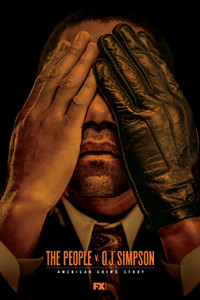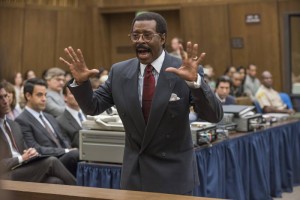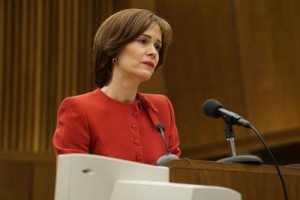 Just as it was more than 20 years ago during the so-called Trial of the Century, the nation appears to still be riveted by the case of O.J. Simpson and the accusations that he murdered his former wife Nicole Brown Simpson and her friend Ronald Goldman.
Just as it was more than 20 years ago during the so-called Trial of the Century, the nation appears to still be riveted by the case of O.J. Simpson and the accusations that he murdered his former wife Nicole Brown Simpson and her friend Ronald Goldman.
FX’s 10-part limited series “The People v. O.J. Simpson: American Crime Story,” which concludes Tuesday night with an episode titled “The Verdict,” has garnered some of the highest ratings in the cable network’s history.
Even as this enthralling production draws to a close, there is much more TV time that will be devoted to the NFL star known as The Juice, who is now serving time in a Nevada prison for his role in a 2007 Las Vegas robbery involving some of his sports memorabilia. Simpson is up for parole in October of next year.
ABC and ESPN will premiere the highly anticipated “OJ: Made in America” in June, with the first two-hour episode slated on the Alphabet Net, which will presumably hook audiences into viewing the remaining four installments on ESPN. And in a novel move, the 7½-hour docuseries will be released in its marathon entirety on the big screen in order to potentially qualify it for Academy Award documentary consideration.
Early next year, Investigation Discovery will air a six-part documentary series that takes a different approach — as demonstrated by its title, “Hard Evidence: O.J. Is Innocent.” It is based on the work of private investigator William Dear, who teamed with a former LAPD forensic psychologist and a Rhode Island police sergeant to re-examine the case — with the conclusion that there is a new suspect. Martin Sheen is an executive producer and will narrate the series.
“American Crime Story’s” nine episodes thus far have dramatized the events after the Goldman/Brown murders at her home in Brentwood, Calif., on June 12, 1994, and the intense legal battles between the prosecution and the defense to convict or acquit the football legend of double homicide.
Based on the Jeffrey Toobin book “The Run of His Life: The People v. O.J. Simpson,” the series explores the machinations, maneuvers and manipulations employed by both sides — and how the defense used the LAPD’s checkered history with the city’s black community and the virulent racism revealed to be spewed by Detective Mark Fuhrman to give the jury what it needed, reasonable doubt.
With a stellar cast including Cuba Gooding Jr. as Simpson, Sarah Paulson as Marcia Clark, Sterling K. Brown as Christopher Darden, Courtney B. Vance as Johnnie Cochran, John Travolta as Robert Shapiro, Nathan Lane as F. Lee Bailey and David Schwimmer as Robert Kardashian, the series is providing a new generation with dramatizations of iconic O.J. scenes including the nationally televised low-speed Bronco chase down L.A. freeways, the fitting of the leather glove and the revelation of the Fuhrman tapes — and insight into the strategies and tactics pursued in the name of justice.
Co-executive producer Anthony Hemingway, who also directed five of the 10 episodes (executive producer Ryan Murphy and director John Singleton helmed the others), says the aim of this series was also to present the humanity of all the characters — living and dead.
I sat down with Hemingway on the eve of the finale to explore some of the many issues and emotions raised by the provocative series. Here is an edited version of our conversation:
Hillary Atkin: I’m interested in your personal connection to the O.J. Simpson criminal trial. How much attention did you give it and what were your thoughts at the time?
Anthony Hemingway: I was 19 when the actual trial was under way. A fun fact is that at the time, I was an assistant director working with Sarah Paulson, who would go on to play Marcia Clark, in a show called “American Gothic.” There was obviously an “American” theme going on. It was very interesting, at that age in my life, O.J. was that kind of pillar in the community in the sense he was a hero, he had made it and was successful. But once this happened, there were conflicting associations and feelings. One was by having sensitivity to the actual crime and the lives that were lost, juxtaposed with getting through the trial and seeing a black man win was definitely a mixed situation. I got to understand and see the racial divide, that most people were pissed off that he was found not guilty. And predominantly the black community was celebrating, with a sense of finally getting an opportunity of coming out on top and beating the system. It was definitely an interesting time for me, a crossroads of figuring out my path. I learned a lot from a moral standpoint, and it definitely affected my moral compass.
HA: Cut to 20 years later. You’ve had a successful career directing some of television’s finest shows including “The Wire,” “Treme,” “The Newsroom,” “Shameless,” “True Blood,” “Power,” “Empire,” WGN’s new “Underground” and the 2012 feature film “Red Tails.” How did you come to be involved with this project?
AH: It came to me through Ryan Murphy. I was directing an episode of “Glee,” and before I completed that episode he said he wanted me. I asked why, why me, why this story? It started a series of questions and of figuring out a decision. It’s almost like the scene where Chris Darden confronted Marcia Clark about whether she just wanted a black face [on the team]. I contemplated not doing it, but then got to meet Scott [Alexander] and Larry [Karaszewski], who answered my questions of what’s new, what’s the point of view and the intention of the series at large.
The main thing was knowing we were giving humanity to the characters and people involved, and learning about them, why they responded and reacted and made the choices they made in terms of their approach to the case. To understand it from a personal standpoint, that was very interesting to me. Once I saw the quality of the actors, I quickly rose to the occasion. Scott and Larry had already broken out how they wanted to tell each hour. Once hired, I did work closely with them. They had done so much research, and they wrote two of my episodes.
HA: By directing literally half of the episodes, what were the biggest challenges for you as a director and as a co-executive producer?
AH: With anything that has a large historical footprint, there’s always the pressure of getting it right, especially when you have a project that portrays people who are still living. I make sure I bring a level of integrity and respect. Especially in a story like this we had to have a level of sensitivity. There’s a tough balance to this: juggling the tragedy, the drama and the absurd humor — and it’s a fine line in getting it wrong and well-balanced — it could go wrong easily. All the talent helped each other up and supported each other’s efforts.
HA: With the finale approaching, take us back through what you think are the key elements in the series leading up to this point.
AH: What really opened up our eyes was what Marcia Clark was going through. Her own personal conflict was a major thing to understand. Even O.J.’s journey within himself — losing his own confidence and trusting Cochran to come in and Cochran to remind him of who he was and what he meant to so many. Cochran knew he couldn’t win if O.J. didn’t believe in himself. The whole vulnerability of Marcia Clark, and the glove episode. One of the other highlights that was pivotal was the point of view from the jury. That was very enlightening. No one got to know any of them. Having a moment to understand how the stress affected them. The sequestered world they lived in. The whole Darden and Marcia Clark dynamic, him feeling like he was used, not seeing eye to eye but trusting each other. It’s a big human story, to pull from our personal lives. Marcia was so misunderstood then, and I’m really happy that this show has given her the humanity she deserves.
HA: Let’s talk about some of the characterizations of the real people portrayed by your actors. Several of your episodes follow the relationship of the Cochran and F. Lee Bailey characters. And Kardashian seems to serve as a conscience, struggling between his loyalty to O.J. and what he feels in his heart about the murders.
AH: One of the interesting things I take away was something that men alone struggle with, the male ego and power. These were two who needed each other. You had Bailey at a low point in his career and Cochran almost the same. Amongst these parallels were guys that were somewhat the same, but different, yet having the same common goals. Throughout the process you get to see how men lose that curse, that ego thing men have, the whole competition attitude.
Then they allow themselves to fall back and be a little vulnerable, they listen and learn — there’s a study there. It’s something subjective to whoever watches it and how it relates to their life. I try to figure out how to tell stories that don’t emasculate men but allow them to realize it’s OK to have sensitivity and vulnerability. It was interesting watching the two of them walk the same walk.
Schwimmer stood out to me in so many ways in his quiet strength. He was so conflicted in supporting his friend, he had a feeling of the truth. At the same time his religious and spiritual background challenged that. He did such great stuff being subtle but punctuated. Sometimes it didn’t need a lot of exposition. It challenges the viewer and allows them to have an opinion or a point of view. That’s one of the larger dynamics. How L.A. felt during the course of the trial.
HA: People who lived through it will never forget the Bronco chase, when O.J. tried on the bloody gloves in court and the revelations about Mark Fuhrman’s racism that he lied about on the stand.
AH: With those iconic situations, those were challenging, people really remembered them. What little creative license we took, those were moments that were really accurate and given attention to detail. The glove moment, one could question whether it fits. Then it didn’t. It was a gray area. Lots of speculation and ambiguity. Those are moments we aimed to get correct, those are the ones we were really focused on. You follow Bailey and Cochran down to North Carolina, you get to see the writer who interviewed Furman [and got his racist comments on tape]. It’s really surreal, and it just continues to add so many layers to this thing. I understand how it took so long. When you get to those tapes, the fact that one person can express his hatred to so many people is mind-blowing.
When you look at both sides of the prosecution and defense, Cochran was a genius using every opportunity to support his case.

THE PEOPLE v. O.J. SIMPSON: AMERICAN CRIME STORY Courtney B. Vance as Johnnie Cochran. Photo Credit: Prashant Gupta/FX
HA: Despite the fact that everyone knows how the trial played out, what has surprised you or enlightened you the most about how the series has been received?
AH: The fact that it is the most watched, most talked about show feels like we are replaying history. We’re taking a step back in time. The interesting thing is how even more relevant it is, the social observation in our consciousness and world. It almost has a positive effect instead of being sad and negative as it was. I’m looking to find a healing mechanism that advances us forward. It allows us to see how we can improve upon things and become better. We’ve made progress, but there’s more room for growth and healing. It becomes [a part of] everyone’s conversation. I hope it influences and impacts everyone’s consciousness in what we can do to come together and be better.
HA: The fascination with O.J. himself does not seem to have waned much over the years, or is resurging because of this show and others coming down the pike.
AH: It’s really interesting to see how it’s become part of the zeitgeist. I go back to one of the lines that Ron Goldman’s father said when he first met with Marcia in terms of everything is about O.J. — but his son’s life was lost. It’s interesting again to see how in the midst of what this show can do, it gets hung up on O.J. himself. The show was structured to get behind that wall and breathe humanity into these characters, but it’s interesting how it still can get stuck at first base. It’s also interesting to see how the trial launched reality TV and that perspective in the public’s eye.
Life is so complex, and part of the challenge is to stay true and deal with life’s complexity. At the end, the distrust in the system comes from different angles, it’s not just black and white. It plays into favoritism. I realized because O.J. had the means to afford it just goes to show how the system works. If you’re middle class or lower class you can almost forget it. At the end of the day, it’s about race and privilege in America and showing how the justice system shows favoritism to the rich.
(The finale of “The People v. O.J. Simpson: American Crime Story” airs Tuesday, April 5, at 10 p.m. on FX.)


